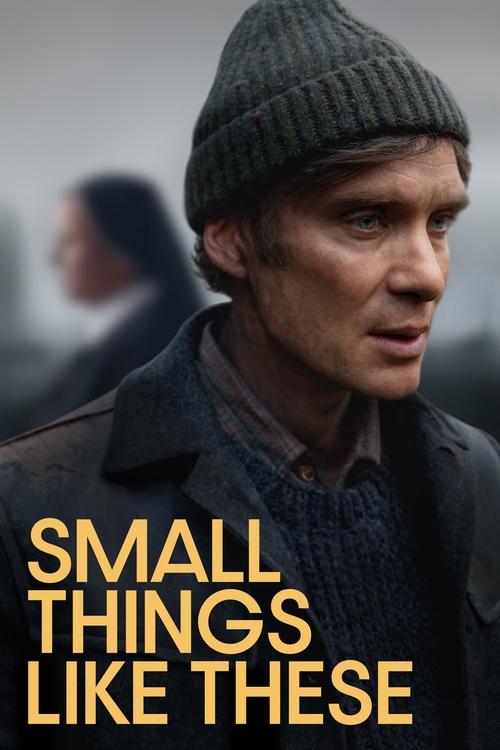Small Things Like These – Film Review
Published December 17, 2024

Tim Mielants’ Small Things Like These, an adaptation of Claire Keegan’s acclaimed 2021 novel, is a restrained yet profoundly moving historical drama that unflinchingly examines the dark legacy of Ireland’s Magdalene Laundries. Led by a quietly stunning performance from Cillian Murphy, who also serves as producer, the film brings to life an intimate story of personal morality set against a backdrop of systemic abuse and societal silence. Its weighty themes are delivered with subtlety and respect, offering viewers a haunting tale about a man who is faced with the choice between complicity and bravery.
Set in 1985, as Christmas draws near, the film takes us to the small Irish town of New Ross, where coal merchant Bill Furlong (Cillian Murphy) lives a humble but content life as a father of five daughters and a devoted husband to Eileen (Eileen Walsh). From the opening scenes, there’s an almost meditative simplicity to Bill’s daily routine — an industrious man fulfilling deliveries, nodding to townsfolk, and quietly carrying the burdens of his difficult childhood. This grounded depiction of small-town life is both picturesque and suffocating, the crisp cinematography capturing the cold beauty of winter while underscoring the stifling influence of institutional authority.
The first half of Small Things Like These moves patiently, laying the groundwork for the moral dilemma that will test Bill’s resolve. Through a series of understated yet emotionally potent flashbacks, we see glimpses of Bill’s upbringing as the child of an unwed mother — an existence marred by stigma and social rejection. These fragmented memories weigh heavily on Bill’s present-day conscience, imbuing his character with a depth that Cillian Murphy masterfully portrays. His eyes carry the unspoken pain of the past, while his silence reflects a man who has learned to survive by keeping his head down. Murphy’s performance is nothing short of captivating; he conveys multitudes without uttering a word, his stoicism gradually giving way to moral clarity.
The story turns when Bill discovers a teenage girl, Sarah, locked in a coal shed on the grounds of the local convent. This pivotal moment, rendered with stark realism and muted horror, is the film’s emotional linchpin. Emily Watson’s Sister Mary, the Mother Superior of the convent, emerges as a chilling symbol of the system’s oppressive power. Watson delivers a masterclass in restrained menace, cloaking her manipulative authority beneath an outward veneer of civility. Her exchanges with Bill are taut with unspoken threats, as she subtly reminds him of the consequences of defiance — consequences that extend to his daughters and the tenuous comfort of his family’s life.
What makes Small Things Like These so compelling is the way it explores moral complicity within a deeply entrenched system. Enda Walsh’s screenplay avoids melodrama, favoring naturalistic dialogue and understated tension to drive the narrative. The film doesn’t rely on sweeping speeches or overt conflict to make its point. Instead, it builds a quiet unease as Bill wrestles with his conscience, torn between self-preservation and the knowledge that silence perpetuates suffering. This thematic tension is amplified by the societal complicity of the townspeople, who turn a blind eye to the convent’s cruelty, either out of fear, ignorance, or an unwillingness to disrupt the status quo.
The supporting performances add richness to the film’s emotional tapestry. Eileen Walsh delivers a layered portrayal of Eileen, Bill’s wife, whose practical outlook contrasts with her husband’s internal struggle. Her character embodies the pressures of small-town conformity and the instinct to protect one’s family above all else. Michelle Fairley’s turn as Mrs. Wilson, the wealthy landowner from Bill’s past, adds a bittersweet dimension to his childhood memories, hinting at kindness amid a harsh world.
Cinematographer Frank van den Eeden captures the film’s somber beauty with a restrained visual style that mirrors the story’s tone. The icy landscapes, dimly lit interiors, and shadowed convent halls create an atmosphere of quiet dread, while also underscoring the emotional isolation felt by Bill and Sarah. The production design, too, is meticulously crafted — the Furlong family home feels warm and lived-in, a stark contrast to the cold austerity of the convent.
One of the film’s greatest strengths is its refusal to sensationalize its subject matter. Mielants handles the atrocities of the Magdalene Laundries with sensitivity, focusing on the human cost rather than depicting graphic horrors. By centering the story on Bill’s small yet courageous act, Small Things Like These becomes a meditation on the power of individual choice in the face of institutional injustice. The film’s final act, though understated, resonates with quiet triumph, leaving a lasting impact without resorting to sentimentality.
That said, the film’s deliberate pacing may test the patience of some viewers. Its minimalistic storytelling demands full engagement, and those seeking a more traditional narrative arc or dramatic crescendo might find its subtlety frustrating. However, for those willing to invest in its quiet rhythms, Small Things Like These rewards with a deeply affecting portrait of moral courage and compassion.
Tim Mielants has crafted a film that feels both timeless and urgent. The story of the Magdalene Laundries, which operated in Ireland until 1998, remains a scar on the nation’s conscience, and Small Things Like These serves as a powerful reminder of the dangers of silence in the face of systemic cruelty. At its core, it is a story about ordinary people making extraordinary choices — about a man who, by choosing to act, reclaims his own humanity and restores dignity to another.
Cillian Murphy’s performance anchors the film with quiet gravitas, while the supporting cast and precise direction ensure that its message resonates long after the credits roll. It is a film that speaks volumes through its restraint, inviting viewers to reflect on the small acts of kindness that can challenge even the most oppressive systems.
In Small Things Like These, Tim Mielants delivers a sobering yet hopeful exploration of courage, compassion, and the quiet heroism that lies in doing what is right. It is a film that lingers in the mind, urging us to confront the past while reminding us of the power of empathy and action.
